
15 minute read
The High Holidays
Online or in-person?
SAFETY IS THE FIRST PRIORITY FOR THE HIGH HOLIDAYS
BY STACEY DRESNER
Rabbi Valerie Cohen of Temple Emanuel Sinai in Worcester began thinking about High Holiday services at her synagogue right after Passover, spurred on by concern about Covid-19.
“We started thinking about it early, earlier than I’ve ever thought about the High Holidays before,” Rabbi Cohen said.
In early June, the TES board made the decision that High Holiday services this year would be virtual.
“The decision was made because nobody knew what was going to happen and we could either spend a tremendous amount of energy pivoting if we needed to, or we could spend a tremendous amount of energy doing a really good job planning something that we knew we would be able to do no matter what.”
“We have been exploring what we can do in person safely…We haven’t done anything in person yet, although we’re working on it and I’m hoping that by the end of the month we will have an in-person gathering,” she said. “If that goes well, then we might be able to do an in-person gathering between Rosh Hashana and Yom Kippur that has a High Holiday element to it. We are planning for what I would call a drive-in shofar blowing experience – a drive-in in our parking lot. I think the value of hearing the shofar is one of the most important things that people want and need on the high holidays…
RABBI VALERIE COHEN And I think we are going to do it on the afternoon of the second day of Rosh Hashana.”
“We are working hard to plan services with the acknowledgment that we are in a different venue,” said Rabbi Cohen. “We are not going to plop what we have done in the past into an online service.”
Like Temple Emanuel Sinai, most, if not all Reform and Conservative congregations will be holding Zoom and live-streamed Rosh Hashana and Yom Kippur services this year.
Congregation Beth Israel in Worcester, which is Conservative, will be holding shortened 2- to 3-hour live-streamed Rosh Hashana services and abridged live-streamed Kol Nidrei, Yom Kippur, and Neilah services.
On the evening of July 29, Erev Tisha B’Av, Rabbi Aviva Fellman of Congregation
Beth Israel led the congregation’s first Orthodox synagogues, like Congregation in-person service at the synagogue since B’nai Torah in Longmeadow, will not be the Covid outbreak. Sixteen members holding online or electronically transmitted attended while the service was Zoomed to 30 services on the High Holidays for reasons of households. (See page 7 “On Tisha B’av, The halacha. But B’nai Torah will be offering a Rabbi Cried Happy Tears.”) couple of different in-person service options
“I refuse to make our community choose for its members. between being part of our community by B’nai Torah has sent out a survey to all of coming in person and their safety by staying its members sharing the options and asking home and so it is of paramount importance members what services they would like to that we offer, especially as we have started attend. opening for limited in-person gatherings, Depending on how many register for the streaming or zoom (service dependent) as services, outdoor and tented services might well,” said Rabbi Fellman. be possible. “I work tirelessly to break Due to state guidelines on down barriers to inclusion and indoor events – 10 people per foster acceptance of all in religious thousand square feet -- B’nai spaces and this is no different. We Torah must limit the number of do not need to carry the High Holy members at each indoor service Days alone and this is a way to help at its Eunice Drive synagogue engage and be “home” during the to 80 in both the sanctuary holidays.” and attached social hall. Those
Congregation Beth Israel will attending must wear masks allow members to register for Ark and maintain 6-feet of social visits during the month of Elul, distance. so that they can offer personal Rabbi Shlomo Yaffe prayers, a custom of the temple’s RABBI AVIVA FELLMAN said they are making some Neilah service. concessions this year with
They are also asking members who have regard to concerns about Covid. shofars to gather safely around town for live “Not only are we following all the state shofar blowing in the second day of Rosh guidelines and so on… we have made it clear Hashana. to our membership that if their doctors say there is a degree of danger they shouldn’t come and they should pray at home. We are doing a lot of things to facilitate. One is, based on how people respond to our survey, if I have enough people in an area we can do shofar services in parks or open areas. If I get enough people from a neighborhood say, I can walk over. For people who are truly homebound we’ll show up and they can open their window and hear it from a safe distance.”
Making that even safer, the shofar is blown only on the second day this year, because you don’t blow the shofar on Shabbat, upon which the first day of Rosh Hashana falls.
In addition, because the Kol Nidre prayer is actually recited before Yom Kippur starts, B’nai Jacob will be able to Zoom the prayer.
This includes services at its Eunice Drive building and its Sumner Avenue location in Forest RABBI SHLOMO YAFFE Park, but space there is extremely limited.
There will be a traditional full service although shortened from the usual length as per Rabbinic guidelines regarding the COVID-19 pandemic.
“The reason the service is so long on Yom Kippur is because there is liturgical poetry which is very beautiful in whatever language you say it, but because the time of exposure is a big issue, the service is going to be much shorter. Rabbi Yaffe also likes to hold “user-friendly” services “for those who aren’t necessarily familiar with Hebrew …an abridged version, much more explained and much more accessible.”
But holding such services on the busy High Holidays hasn’t always been easy.
“Now since the morning service, the primary service is so much shorter, in the afternoon we will be having the user-friendly service,” Rabbi Yaffee said. “Whether we have an outdoor service or a tent is dependent upon what people say in our comprehensive survey. That is up in the air right now.”
KOLOT On Tisha B’Av, the Rabbi cried happy tears
BY RABBI AVIVA FELLMAN
Tisha B’Av marks a communal day of mourning for the Jewish people. It is a day on which we mark the destruction of the First Temple (by the Babylonians in 586 BCE), the Second Temple (by the Romans in 70 CE), multiple expulsions, and pogroms. The day is observed by reading from Eicha (Lamentations), sitting low to the ground, not wearing leather, refraining from food and drink. The whole tone of the day is solemn.
For the past 7 years, since moving to Worcester to serve the Congregation Beth Israel and community, my Tisha B’Av has started the same way. I have eaten an earlier dinner with my family, and then headed to shul for services and Eicha. This year was the same, only it felt so different.
The evening service opened with these words: V’hu rachum yechaper avon v’lo yashchit - God is compassionate and will wipe away sin, not wreak destruction,
V’hirbah l’hashiv apoh v’lo yair kolchamato - For again and again God acts with restraint, refusing to let rage become all-consuming,
Adonai hoseah hamelech yaanenu b’yom koreinu - Adonai-help us - surely our sovereign will answer us at the hour of our calling.
While these words start each evening service, last night, on a day of such intense observance of mourning and loss, they seemed much more poignant. The mourning and loss this year feels different and personal. We are mourning not only the Jewish historical events that pre-dated even the honored elders of our community but this year we are also mourning the loss of family, neighbors, and friends. As Tisha B’Av was beginning this year, the death toll from COVID-19 hit 150,000 in the US alone. We are mourning our sense of security and safety. We are mourning the sense of danger that permeates every interaction outside of our home. We are mourning the sense of brokenness in the structures that helped to make us feel secure- our routines, being able to see the faces of others, of seeing family, of gathering to celebrate and mourn, of singing, and of being able to hug others.
There was and is a great sense of loss, and yet, when I got to the next words of the service, I started tearing, sobbing really – large, messy, happy tears. As I moved through the service and started reciting the words of the Barchu, I could no longer hold back. Why? What was different? I felt such an overwhelming flood of emotion. These nine words were so familiar and yet felt so new. Maariv for Erev Tisha B’Av, the service that I was leading, was the first time in 4.5 months that we had gathered for services in person at the synagogue. (We officially closed the building on March 13th.) The Barchu prayer is only recited in the presence of a physical minyan and in the period since we closed the physical building and moved our community worship online, we have omitted it from all services.
It felt comforting, familiar, and special to recite the words and so new and fresh. Had it not been for the otherwise solemn tone of the day, I might have interrupted the service to recite a Shehechiyanu, a blessing that is said upon new experiences (including not having seen someone in over 30 days), but it was Tisha B’Av and it did not feel appropriate.
So I cried. I cried and I cried and I kept leading. As I teared into my mask, hoping that my voice would still carry over the microphone to the 16 congregants behind me in the room and hallway and to the 30 devices at home pictured on the screen in front of me, it made me realize how much I had really missed being able to daven (pray) with the support and voices of community.
Last night was not perfect and I don’t want to claim that it was. There were a few glitches that we will work through, although wonderfully far fewer than we expected. Technology and safety will always be a work-in-progress and we will continue to try and make the service, the space, and the streaming as smooth and clear as possible. We are indebted to the members of our synagogue family who have been calling Beth Israel their home and continue join us in community. Our Security/Health and Safety, Reopening, Facilities, Medical, and Ritual committees and task forces have been working tirelessly and then some to get us to this point with intention, caution, communication, drive, patience, and sensitivity. Our staff have kept the building and community operating and running often behind the scenes, I am appreciative of how resilient and supportive they have been.
This morning as I read Eicha on our Zoom Shacharit service, I had sad tears in my eyes. Zoom now feels so comfortable and normal and yet it does not compare
NEW LIMITED TAKE-OUT MENU New Hours: Open 7 days, 8:00 a.m. - 8:00 p.m. Hours subject to change. Please call ahead Take-out and curbside pick up CALL TO PLACE YOUR ORDER: 860.875.1344
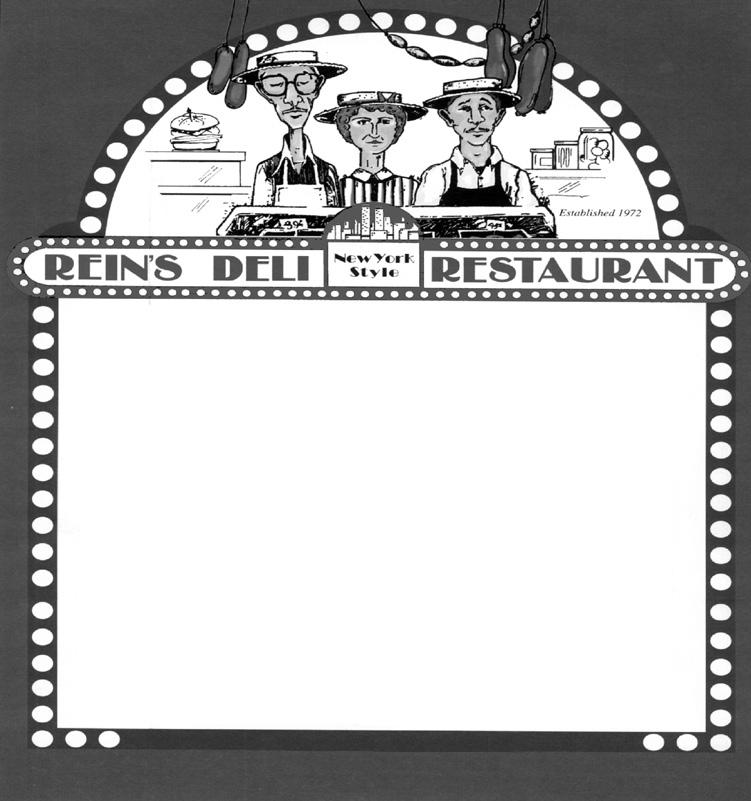
We are currently offering: Restaurant To-Go Hot and cold sandwiches • Hot entrees • Salad platters Sliced deli meats, cheeses and salads by the pound Grab n’ Go Retail Fresh cold entrees, soups and chilis • Frozen entrees Bakery (bagels and rye bread) • Our own ruggalach and cookies We also have beers and hard seltzer to-go in our cooler. Note: all alcohol to go purchaes must be accompanied by a food order per government mandate.
We thank you and are tremendously grateful for your continued support with take-out.We are doing everything in our power to keep you safe. Be healthy! The Taste of Quality is Long Remembered
AtoZMoving&Storage,Inc. Owneroperatedandproudlyservingthecommunityand greaterNewEnglandforover25years RobertZeller “Happy feetmove faster”
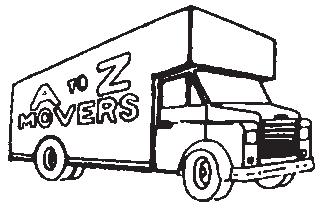
413-736-4440 visit a-z us m onthe over w s. ebat net :
to gathering in person. On Zoom, I can let my guard down a little. I don’t have to wear a mask. If bodies are getting too close to mine, I don’t feel that I need to recoil because those bodies live in the same house. And I can see the faces of others making it feel like a community. But it is no comparison to in-person. Last night reminded me of how much I had missed davening with our community, raising our voices in song, catching up and checking in with each other. It makes me want more and knowing that it is limited is hard.
The line that closes our Eicha reading (really second to last line that is repeated again at the end) is, “Take us back, O LORD, to Yourself, And let us come back; Renew our days as of old!” Throughout the day of Tisha B’Av, there is a gradual shift as we rise from our mourning. I pray and long for the day when we can gather again regularly in-person. Until then, I will mourn that loss and rise to embrace the safe and secure routine that has become Zoom and work hard to continue to build ways for us to gather and build community even without the physical closeness and communal singing.
“See” you soon in-person or online.
Aviva Fellman is rabbi at Congregation Beth Israel in Worcester.
Thanking our Healthcare Heroes and Feeding the Frontlines
WESTERN MASS. – When Covid-19 hit Western Mass., Suze Goldman knew she had to do something to help healthcare workers on the front lines who were working with Covid patients at their own risk. Goldman, a former president of the Jewish Federation of Western Mass. and a supporter of Rachel’s Table, the Federation’s hunger rescue and relief program came up with the initiative “Feeding the Front Lines” which provided essential health care workers with meals from local restaurants throughout Hampden, Hampshire, and Franklin County. Through the initiative, Goldman sold 450 face masks for the benefit of Rachel’s Table, with the funds raised paying for the healthy lunches and dinners that were delivered to nursing homes and local hospitals like Mercy Medical Center, Jewish Geriatric Services-Lifecare, Reeds Landing, Governor’s Center and others. Sarah Maniaci, associate director of Rachel’s Table connected with Bobby Barkett, owner of The Kitchen, a restaurant in Longmeadow, who provided the sandwiches, chips, and fruit and distributed the meals. Zach Schwartz of Fusion Signs joined the effort by donating a percentage of his signs sold supporting our heroes to Rachel’s Table. The effort provided meals for the state police, firefighters and first responders in Franklin County, as well. Jodi Falk, director of Rachel’s Table coordinated bringing healthy lunches from Subway and Antonio’s to healthcare workers at Poets Seat Health Care Center, Charlene Manor and others. With funds raised including the generous donations from many supporters, approximately 900 meals were provided to workers on the front lines. Next, the initiative turned to essential health care facility and nursing home staffers and more funds were raised to produce gift bags containing gift cards for groceries at Stop & Shop. Judy Yaffe, a veteran Rachel’s Table board member coordinated efforts to deliver gift cards to area agencies. Shown below, Suze Goldman, right, delivering Rachel’s Table’s first batch of grocery gift cards as a token of appreciation to the health care team at Care One in East Longmeadow on July 22. Since then, grocery gift cards have been bestowed upon essential health care workers at several other healthcare centers and nursing homes in Hampden and Hampshire Country.
“It became a multi-pronged initiative that was just terrific,” Goldman said. “Everyone was so happy to contribute. It was the community
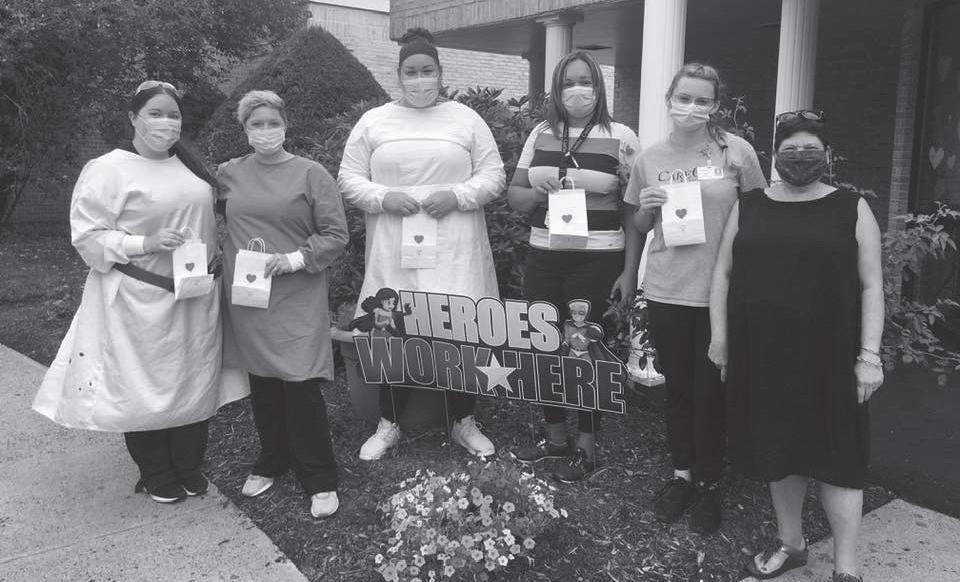
LONGMEADOW ARTIST CINDY LUTZ KORNET’S IMAGE THAT WAS USED IN RACHEL’S TABLE’S “FEEDING THE FRONTLINES” INITITATIVE.
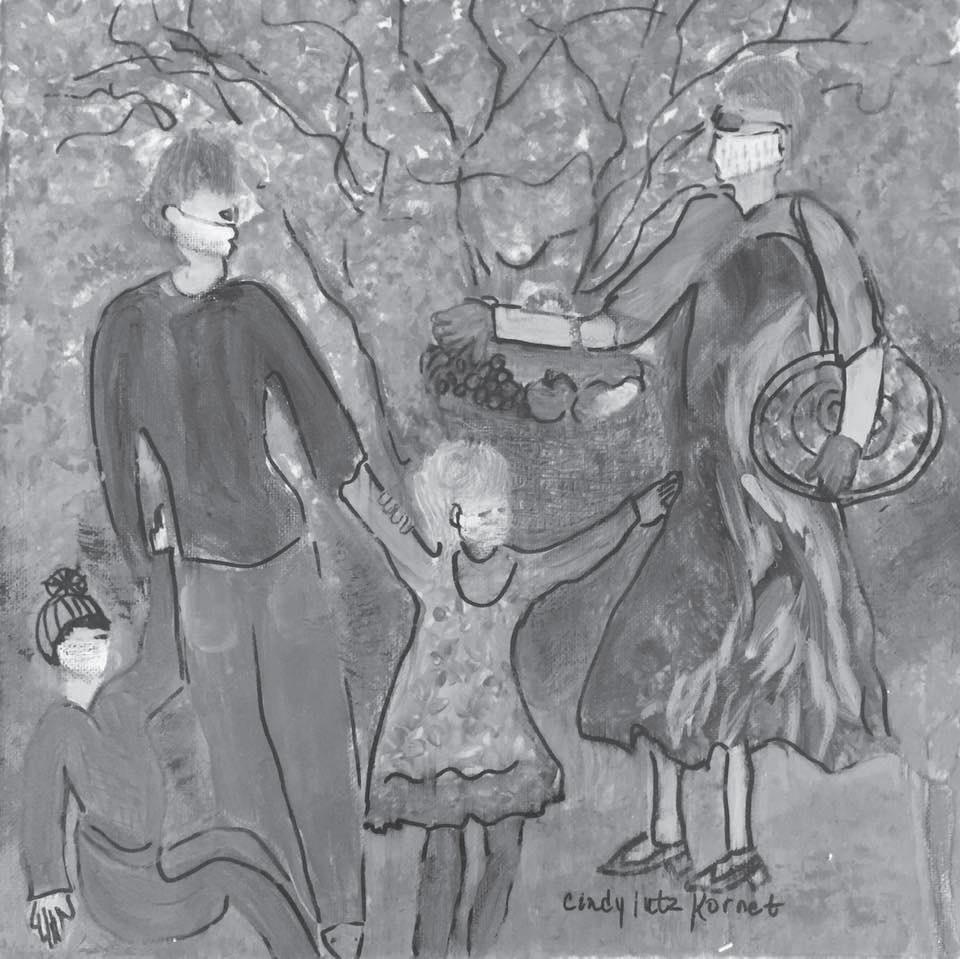
ERIC AND MARGIE BERG TAKE COMMUNITY ON A VIRTUAL TRIP TO ISRAEL WITH JEWISH NATIONAL FUND-USA.
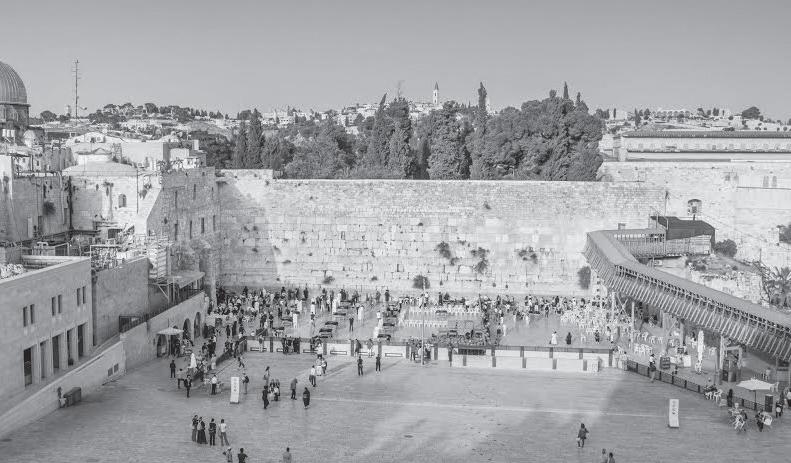
EAST LONGMEADOW -- With the latest predictions suggesting Israel’s tourism industry could lose up to $1.16 billion due to the COVID-19 crisis, Jewish National Fund-USA (JNF-USA) in Western Mass is helping Israeli tour guides through an innovative new ‘virtual travel’ initiative.
In launching JNF Virtual Travel & Tours, the organization’s travel department is offering seats on virtual tour buses to some of Israel’s iconic and lesser-known travel destinations. Current itineraries include visits to the Old City of Jerusalem, Ayalon Institute, Akko, Be’er Sheva, and the JNF Sderot Indoor Recreation Center.
“As many of us continue social distancing due to the pandemic, I think our community has gained a greater appreciation for the rich calendar of in-person communal events that we once had, and will continue to have, when life slowly returns to normal,” said Eric Berg, JNF-USA Southern New England Campaign Chair. “Naturally, people miss interacting with each other which is why I believe our virtual tour initiative has been so successful.”
The virtual buses include seating for up to 22 participants. Each bus also includes a licensed Israeli tour guide and a professional JNF-USA staff member. A $50 per “Zoom window” registration fee covers one hour of touring per day over the weeklong visit which takes place Monday through Thursday for two hours during the afternoon. The first hour is for touring and the second hour provides an opportunity to debrief and socialize with a cocktail in hand. On Friday, participants will experience a beautiful pre-Shabbat experience between 4-5 p.m.
“We were delighted to lead our week-long tour of Israel because it enabled us to support Israel’s out-of-work tour guides while also providing our friends, family, and neighbors with an opportunity to connect with Israel and one another,” said Margie Berg. “I don’t think we could have anticipated how meaningful our virtual trip would be.” To reserve a “seat” on a JNF-USA’s virtual tour, visit jnf.org/virtualtours.
Drive through produce
WORCESTER – On Aug. 5 and 12, Central Mass Chabad, in collaboration with Boston Area Gleaners of Waltham, distributed boxes of fresh produce to members of the community free of charge. “We must all work together to navigate turbulent times, for only together will we make sure that no one goes without,” said Rabbi Mendel Fogelman. Volunteers handed out boxes of fruit and vegetables to families at Chabad, 22 Newton Ave., and future weekly distributions are planned. Go to www.CentralMass.Chabad.com


